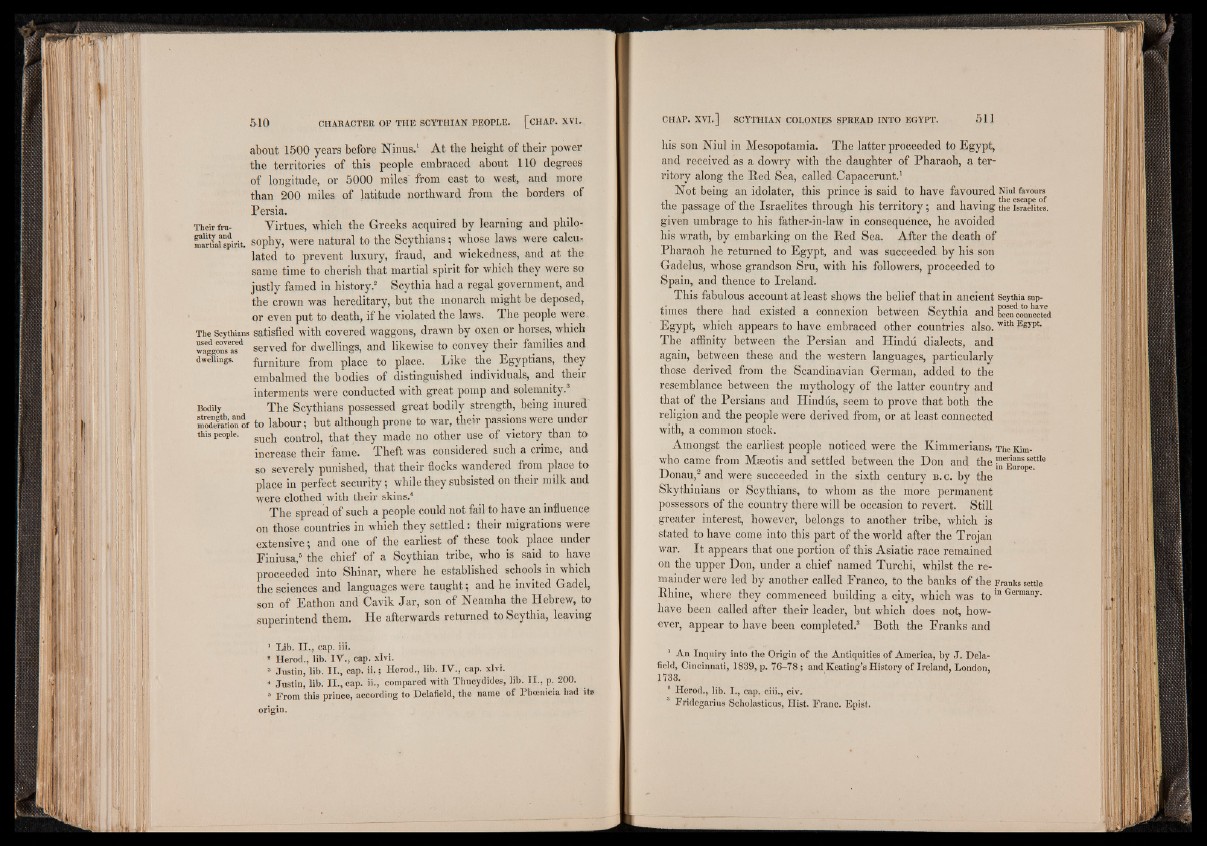
about 1500 years before Ninus.1 At the height of their power
the territories of this people embraced about 110 degrees
of longitude, or 5000 miles' from east to west, and more
than 200 miles of latitude northward from the borders of
Persia.
Their fru- Virtues, which the Greeks acquired by learning and philomertud
spirit, sophy, were natural to the Scythians; whose laws were calculated
to prevent luxury, fraud, and wickedness, and at the
same time to cherish that martial spirit for which they were so
justly famed in history.2 Scythia had a regal government, and
the crown was hereditary, but the monarch might be deposed,
or even put to death, if he violated the laws. The people were.
The Scythians satisfied with covered waggons, drawn by oxen or horses, which
served for dwellings, and likewise to convey their families and
dwellings. furniture from place to place. Like the Egyptians, they
embalmed the bodies of distinguished individuals, and their
interments were conducted with great pomp and solemnity.
Bodily The Scythians possessed great bodily strength, being inured
S f iC o f to labour; but although prone to war, their passions were under
this people. such contro]) that they made no other use of victory than to
increase their fame. Theft was considered such a crime, and
so severely punished, that their flocks wandered from place to
place in perfect security; while they subsisted on their milk and
were clothed with their skins.4
The spread of such a people could not fail to have an influence
on those countries in which they settled: their migrations were
extensive; and one of the earliest of these took place under
Finiusa,6 the chief of a Scythian tribe, who is said to have
proceeded into Shinar, where he established schools in which
the sciences and languages were taught; and he invited Gadel,
son of Eathon and Cavik Jar, son of Neamha the Hebrew, to
superintend them. He afterwards returned to Scythia, leaving
1 Lib. I I ., cap. iii.
! Herod., lib. IV ., cap. xlvi.
3 Justin, lib. I I ., cap. i i . ; Herod., lib. IV ., cap. xlvi.
1 Justin, lib. I I ., cap. ii., compared with Thucydides, lib. I I ., p. 200.
3 From this prince, according to Delafield, the name of Fhcenicia had it*
origin.
his son Niul in Mesopotamia. The latter proceeded to Egypt,
and received as a dowry with the daughter of Pharaoh, a territory
along the Red Sea, called Capacerunt.1
Not being an idolater, this prince is said to have favoured Niul favours
the passage of the Israelites through his territory; and having the Israelites,
given umbrage to his father-in-law in consequence, he avoided
his wrath, by embarking on the Red Sea. After the death of
Pharaoh he returned to Egypt, and was succeeded by his son
Gadelus, whose grandson Sru, with his followers, proceeded to
Spain, and thence to Ireland.
This fabulous account at least shows the belief that in ancient Scythia snp-
times there had existed a connexion between Scythia and beenconnected
Egypt, which appears to have embraced other countries also.Wlth ®s}pt'
The affinity between the Persian and Hindu dialects, and
again, between these and the western languages, particularly
those derived from the Scandinavian German, added to the
resemblance between the mythology of the latter country and
that of the Persians and Hindus, seem to prove that both the
religion and the people were derived from, or at least connected
with, a common stock.
Amongst the earliest people noticed were the Kimmerians, The Kim-
who came from Maeotis and settled between the Don and the ™eSans settIe _ . . in Europe.
JDonau, and were succeeded in the sixth century b . c . b y the
Skythinians or Scythians, to whom as the more permanent
possessors of the country there will be occasion to revert. Still
greater interest, however, belongs to another tribe, which is
stated to have come into this part of the world after the Trojan
war. It appears that one portion of this Asiatic race remained
on the upper Don, under a chief named Turchi, whilst the remainder
were led by another called Franco, to the banks of the Franks settle
Rhine, where they commenced building a city, which was to 111 Germany-
have been called after their leader, but which does not, however,
appear to have been completed.3 Both the Franks and
1 An Inquiry into the Origin of the Antiquities of America, by J . Delafield,
Cincinnati, 1839, p. 7 6 -7 8 ; and Keating’s H istory of Ireland, London,
1733.
a Herod., lib. I., cap. ciii., civ.
“ Fridegarius Scholasticus, Hist. Franc. Epist.